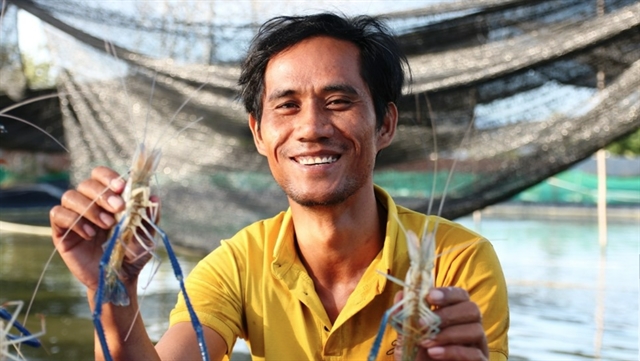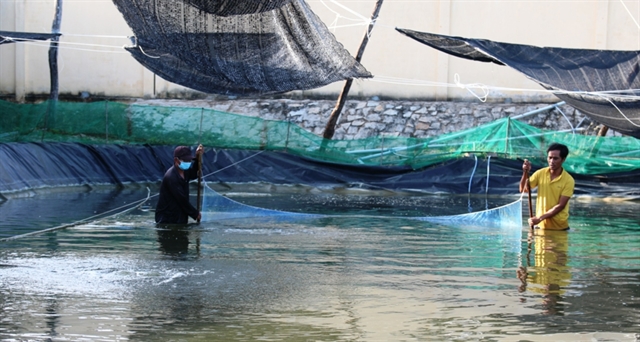 Society
Society


|
| La Hoài Giang is happy with his giant freshwater prawns. — Photo danviet.vn |
NINH THUẬN — A Chăm ethnic man in the coastal province of Ninh Thuận surprised his friends and neighbours by successfully turning barren, dry land into ponds for breeding giant freshwater prawns.
La Hoài Giang of Hiếu Thiện Village in Thuận Nam District’s Phước Ninh Commune has one of the first farms raising prawns in the dry land area of Ninh Thuận .
At present, Giang earns dozens of million of đồng each day from the 6,000 square metre farm of giant freshwater prawns.
“This is the fruitful result of my wife and me after nearly two years of self-learning to raise giant freshwater prawns in this barren and dry land,” Giang told Danviet.
Giang previously had nearly 10 years of experience farming of white-leg shrimp in Từ Thiện Village in Phước Định Commune of Thuận Nam but was not successful.
After that, he moved to HCM City to make a living and married a woman from Long An Province before they both moved back to his hometown in Ninh Thuận.
His parents owned much land but most of it had been abandoned for years as it was barren.
So, in early 2020, Giang started surfing the internet to study and went to his wife’s hometown in Cửu Long Delta region to learn how to raise fish.
“Initially, I just planned to improve the land for rice growing but then I changed my mind to raise fish,” Giang said.
“But through research and my experiences in the Cửu Long Delta provinces, I decided to breed giant freshwater prawns.
"I found the prawn breed was easy to raise and less susceptible to diseases, and female prawns could produce the baby prawns by themselves, so farmers only needed to invest for the first time but the ability to recover capital and economic efficiency was very high."
After acquiring enough knowledge, Giang decided to use his family’s land. In the very early days, his idea was opposed by his parents and wife and laughed at by neighbours because they thought that area was so arid that there was not enough water for living, let alone to raise prawns.
But his enthusiasm convinced his parents and wife.
With initial investment of VNĐ1 billion (US$43,000), Giang dug four ponds to raise the prawns.
The ponds were drilled deep into 50m of soil and through several layers of underground rocks to reach groundwater.
In the first batch, he stocked 15,000 shrimp. After nearly eight months, he harvested the first adult shrimps for sale.
Since then, every day, his farm harvested from 40 to 100 kg of prawns sold at VNĐ 220,000 (US$9.5) per kilo. His daily profit reaches dozens of millions of đồng.
In order to make the prawns grow stably in hot weather conditions, Giang sought solutions to keep the ponds cool by covering them with nets to create shade on the water surface.
“It was to avoid direct sunlight in the pond and make the water temperature increase. If the water temperature and oxygen concentration in the water are stable, the shrimp grow healthily,” Giang said.
Organic farming

|
| Giang (right) with his employee putting out netting to keep the shrimp pond cool. — Photo danviet.vn |
According to Giang, to build trust and meet demand for clean food from customers, his prawns are completely reared and cared for in an organic way.
During the farming process, Giang does not use chemical antibiotics but only natural microorganisms, from fertilising the water, to feeding and cleaning the ponds.
To carry out microbiological farming, especially in creating a natural habitat and food source, Giang grew water hyacinths in the shrimp ponds that create shade and natural food for the shrimps.
The hyacinth clumps are a safe haven for juvenile shrimps.
"After being born, the baby shrimps live in these hyacinth clumps and then grew up so I do not need to spend money on buying new breeds anymore, Giang said.
Giang’s farm was the first shrimp farming model in Ninh Thuận to successfully breed giant freshwater shrimps, which were self-fertilising and could self-hatch baby shrimps in ponds.
“If not be affected by the COVID-19 pandemic, my family could earn VNĐ700million to 1 billion per year with this model," he said. — VNS




